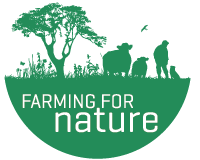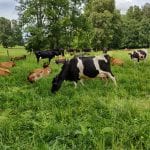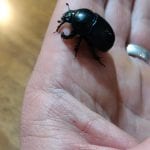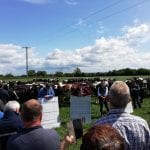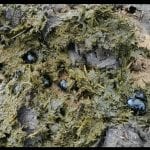Bruce Thompson
CASE STUDY 2021
There are so many good examples of best practice amongst the nominations that we receive every year for our Farming for Nature Ambassador awards. We want to highlight some of these stories such as Bruce Thompson, a conventional dairy farmer near Portlaoise who is passionate about increasing dung beetles on his farm as that he feels will enhance all aspects of nature on his land. Here is his story, in his own words:
The Dung Beetle by Bruce Thompson
"Much is spoken about the benefits animal agriculture bring to ecology, but have you ever wondered what happens grazed herbage after the animal passes it through their digestive system and puts it out on to pasture? Well grab a “stool” and I’ll try explain. These deposits become a micro-habitat for a whole diverse range of small creatures but, for me, the king of these is the indominable dung beetle. Let’s give him a ‘pat’ on the back. We have approximately 60 species of these beetles in Ireland. These beetles move in to these master-pieces of architecture soon after it has been expelled from the animal. They drink the lovely nutrient-rich juices from the pat, dehydrating parasite and fly eggs rendering them immobile. As the pats dry out, they become appealing to earthworms who complete the cycle by digesting these stores of nutrients and mixing them with the topsoil. We also have a number of beetle species who burrow in to the soil, to lay their eggs, bringing the pat down along with them and placing it at the roots of herbage where all kinds of parasites, flies and animal pathogens won’t come in contact with their intended hosts. This burrowing effect not only aerates the soil and plant roots, but also reduces the risk of nutrient run off polluting our waterways.
However, It’s not all good news I’m afraid. Modern farming techniques have depleted a lot of our beetle populations. Practices such as grassland tillage, wet dung pats derived from modern grass management, removing animals from fields in autumn and leaving no food for the beetles until Spring have all attributed to this situation. However, the biggest factor of all is the use of anthelmintics to “control” parasites in animals, these animal remedies are toxic to beetles with plenty of scientific papers written to confirm this. Some species really are “Up the Creek”. Addressing these issues is what the aim has been on our farm. An integrated parasite management plan has to be part of animal management and with resistance to these drugs becoming more common, we need to keep these medicines for the most susceptible stock and used only when we can demonstrate a need.
The real tragedy of losing beetles (and other dung derived insects) is their loss as a food source for the wider animal kingdom. These beetles are a food source for birds, bats, foxes and badgers. The smaller of these creatures being prey for other creatures. We can turn this story around though, more animals (farmed responsibly) mean more dung pats, more dung pats means more beetles, more beetles means more food available for predators."
For more information on farming and dung beetles please go to this recently launched website: www.dungbeetlesforfarmers.co.uk
NOMINATION DESCRIPTION
Bruce is an intensive Dairy farmer operating a conventional grass based system. He is the 8th generation of his family milking on his farm. Since the abolition of milk quotas, he has increased his herd 400%. His achievements are very much in line with the Teagasc dairy road map and takes great pride in his achievements while still being able to point out his own mistakes. Bruce is very involved in industry as he sits as Chairperson on the his area Glanbia board. He believes that Ireland is a fantastic place to produce good clean food and our reputation of "Clean, Green" is something to take pride in. However he also believes we can't take that for granted. Bruce takes a lot of pride in "his" environment, getting excited to show off "his" Buzzards, red squirrels or pine Martins. He is very much aligned with the thinking that changes will have to take place at farm level to restore the environment. He believes that by gaining the trust of other conventional farmers and influencing small changes at a time, a massive impact could be witnessed as opposed to asking a small few to make a fundamental change. Bruce has a particular interest in reducing animal remedies through prevention, with a focus on animal wormers. He has made dramatic reductions in his wormer usage by making use of his farm microscope for diagnosis and pioneering new grazing strategies. He is confident that by making some changes, the conventional system can be made more environmentally friendly and still have the same production output. He believes a drop in production is only creating a vacuum. He gives a lot of credit to his beloved dung beetles. He believes that with more dung pats there should be more beetles, more beetles would mean more food for birds and bats so their populations should flourish also.....but its not happening. To figure out why, he is currently researching the relationship between dung beetles and wormers with a Nuffield Scholarship and has just prematurely returned home from Australia and Tasmania due to Coronavirus restrictions. Bruce has stated that his life long goal on his farm is to leave it in an enhanced ecological position than when he got it, ".....and it was pretty good when I got it"
Nominator: Peter Dunne, Chairman, Regenerative Farming Ireland
